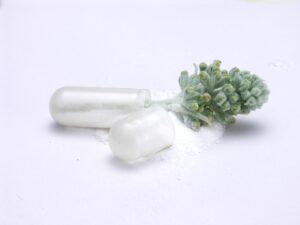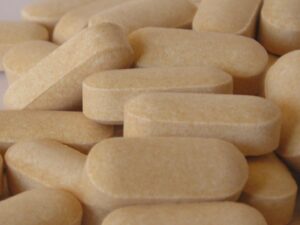 Homeopathy is medication by extremely dilute quantities of toxic substances. The idea is that an ailment can be effectively treated by a substance that causes that symptom to occur in a healthy individual. In homeopathic theory, the more dilute the substance, the more potent the effect. Some homeopathic remedies (ones considered the most potent) are so diluted that they contain no molecules of the substance they claim to contain. The proponents of homeopathic practice claim that the health benefit from these remedies comes from the effect that the molecules of the substance have on the water molecules in the preparation rather than from their own presence. In other words, they say that molecules of the active substance change the vibration or energy of the water molecules, so there is no need for the remedy to contain any of the original substance. Critics of homeopathy say that the only effect of homeopathy is the placebo effect – that people believe that homeopathy will help them so it does.
Homeopathy is medication by extremely dilute quantities of toxic substances. The idea is that an ailment can be effectively treated by a substance that causes that symptom to occur in a healthy individual. In homeopathic theory, the more dilute the substance, the more potent the effect. Some homeopathic remedies (ones considered the most potent) are so diluted that they contain no molecules of the substance they claim to contain. The proponents of homeopathic practice claim that the health benefit from these remedies comes from the effect that the molecules of the substance have on the water molecules in the preparation rather than from their own presence. In other words, they say that molecules of the active substance change the vibration or energy of the water molecules, so there is no need for the remedy to contain any of the original substance. Critics of homeopathy say that the only effect of homeopathy is the placebo effect – that people believe that homeopathy will help them so it does.
Can these claims be verified?
 From a mechanism aspect, it has been proven by visual examination under a microscope that homeopathic remedies often contain none of the supposed active ingredient. While the effect of molecules in solution changing the motion of water molecules is documented, this effect has been found to be temporary (50 femtoseconds – that’s a very tiny portion of one second). The water molecules will return after a short time to their original motion. These preparations are thus very transitory in effect, and cannot be stored for later use. The idea of water memory has been debunked multiple times. The closest anyone has thus far gotten to “proving” the water memory theory is here, but there is not enough information provided to verify the validity of the study, and reviewers admit that the study was not blind and was subject to a number of confounding factors that would invalidate the results. The water’s “memory” did indeed hold for longer, but that is because it was frozen! Moreso, the temperatures at which its structure was seen as being different from one sample to another were temperatures at which the structure would undergo changes at the molecular level anyway, and a portion of a degree or even the smallest amount of contaminant could affect the outcome. If water had a memory and the effects of its contaminants became more potent the more diluted those contaminants were, then tap water, which has been purified highly from contaminants that are not safe for human consumption in higher doses, should be pretty dangerous to all of us.
From a mechanism aspect, it has been proven by visual examination under a microscope that homeopathic remedies often contain none of the supposed active ingredient. While the effect of molecules in solution changing the motion of water molecules is documented, this effect has been found to be temporary (50 femtoseconds – that’s a very tiny portion of one second). The water molecules will return after a short time to their original motion. These preparations are thus very transitory in effect, and cannot be stored for later use. The idea of water memory has been debunked multiple times. The closest anyone has thus far gotten to “proving” the water memory theory is here, but there is not enough information provided to verify the validity of the study, and reviewers admit that the study was not blind and was subject to a number of confounding factors that would invalidate the results. The water’s “memory” did indeed hold for longer, but that is because it was frozen! Moreso, the temperatures at which its structure was seen as being different from one sample to another were temperatures at which the structure would undergo changes at the molecular level anyway, and a portion of a degree or even the smallest amount of contaminant could affect the outcome. If water had a memory and the effects of its contaminants became more potent the more diluted those contaminants were, then tap water, which has been purified highly from contaminants that are not safe for human consumption in higher doses, should be pretty dangerous to all of us.
As for effectiveness, though there are some studies that exist suggesting that homeopathy can have some positive effect, many of these studies have been completed under experimental conditions in which biases seriously affect the outcome.
 For example this study has so many biases and convolutions that it is impossible to ascertain any reliable results from the study. Not only were the doctors free to choose which patients to give which treatments (no blind), but the patients knew which treatments they were being given (no blind). All patients were treated for allergy symptoms, but the patients in the homeopathy group were given a variety of different homeopathic remedies, they also received additional treatments like acupuncture (2.8%), and 16% also received conventional medication. In the conventional medicine group, over 70% were given antibiotics (not a typical allergy treatment), 4.6% were given herbal treatments, 3.4% were given homeopathic treatments, and 1.1% were also given acupuncture. With that much cross-over between treatment methods, the prevalence of antibiotics given when none were indicated, and the fact that patients were selected for various treatments and knew what they were receiving, it’s no wonder that there was a 14% variation in treatment outcomes between the two groups (easily accounted for by the 16% of “homeopathy group” patients receiving conventional medicine) and that more conventional medicine group patients felt adverse symptoms (antibiotics tend to create adverse effects).
For example this study has so many biases and convolutions that it is impossible to ascertain any reliable results from the study. Not only were the doctors free to choose which patients to give which treatments (no blind), but the patients knew which treatments they were being given (no blind). All patients were treated for allergy symptoms, but the patients in the homeopathy group were given a variety of different homeopathic remedies, they also received additional treatments like acupuncture (2.8%), and 16% also received conventional medication. In the conventional medicine group, over 70% were given antibiotics (not a typical allergy treatment), 4.6% were given herbal treatments, 3.4% were given homeopathic treatments, and 1.1% were also given acupuncture. With that much cross-over between treatment methods, the prevalence of antibiotics given when none were indicated, and the fact that patients were selected for various treatments and knew what they were receiving, it’s no wonder that there was a 14% variation in treatment outcomes between the two groups (easily accounted for by the 16% of “homeopathy group” patients receiving conventional medicine) and that more conventional medicine group patients felt adverse symptoms (antibiotics tend to create adverse effects).
The most positive scientifically valid studies towards homeopathy show minor positive outcomes for homeopathic treatment, but these positive outcomes fall within ranges of statistical error. Conclusions of the majority of these positive experiments say that much more study is needed, but that homeopathy does not appear to reliably treat any particular illness. Science has found time and time again that the better the scientific criteria used to develop the study of homeopathy, the less evidence is found for its effectiveness.
 Practitioners of homeopathy point to increasing numbers of people using homeopathy, especially in the United States, as proof of its effectiveness. What these claims fail to address is that numbers of people attempting a treatment is not in any way proof of its effectiveness. It is possible that more people seeking alternative medicine is a result of any number of factors, including loss of confidence in pharmaceutical companies, lack of access to or affordability of medical doctors, or lack of ability for modern medicine to diagnose or cure their ailments. The same article claims that the higher incidence of use of homeopathy in other countries supports its effectiveness. These same people would not support the effectiveness of visiting witch doctors because there are more people visiting witch doctors in other countries than in their own – or would they?
Practitioners of homeopathy point to increasing numbers of people using homeopathy, especially in the United States, as proof of its effectiveness. What these claims fail to address is that numbers of people attempting a treatment is not in any way proof of its effectiveness. It is possible that more people seeking alternative medicine is a result of any number of factors, including loss of confidence in pharmaceutical companies, lack of access to or affordability of medical doctors, or lack of ability for modern medicine to diagnose or cure their ailments. The same article claims that the higher incidence of use of homeopathy in other countries supports its effectiveness. These same people would not support the effectiveness of visiting witch doctors because there are more people visiting witch doctors in other countries than in their own – or would they?
On the other hand, the placebo effect is scientifically verified.People given placebo “treatments” for any number of conditions, even ones with verifiable physical causes, have reported relief of symptoms. This has even happened when they knew they were taking a placebo. People have also reported real negative side effects from “medications” when taking placebos. These studies have been completed in double-blind experiments, though they acknowledge that the act of following up with patients can affect the results (which is also a possible source of bias in homeopathy studies).
 But the FDA regulates homeopathy!
But the FDA regulates homeopathy!
Yes, the FDA does “regulate” homeopathy, but the FDA does not verify that homeopathic remedies do what they say they will or even that they are safe. In some cases of remedies with less dilute preparations, the remedies have been shown to be hazardous to human health or to cause drug interactions. Recently the FTC ruled that homeopathic remedies must display a disclaimer that they are not proven to work, unless companies provide proof of their effectiveness.
Why do people say that homeopathy helped them?
People who try homeopathy fall into two camps: Those who treat themselves based on what they read and remedies that they buy from health food stores and those who visit an integrative practitioner or naturopath and are prescribed homeopathic treatment by that professional. People who approach homeopathy on their own already have some predisposition towards believing in it or “giving it a chance,” or they would not be trying it.
 People who approach homeopathy via an alternative medicine practitioner have a different experience, but it’s my experience that they fall into exactly the same camps as the first group. I went to a naturopath in my search to find out what was wrong with me, before I found out about my allergies. As soon as my naturopath found out that I didn’t believe in homeopathy, he took that option off the table and began to look at other treatments. I heard of a similar experience with another visitor to an integrative practitioner, whose doctor rejected homeopathy as an option when he got the impression that the patient didn’t feel confident about that route. Here there is a bias in who will try homeopathy based on who believes it could work, manipulated by the alternative medicine practitioner. These practitioners further bias/impede their treatments by only treating conditions previously diagnosed by a medical doctor, even if the practitioner him/herself has a medical degree. They will not diagnose anything themselves.
People who approach homeopathy via an alternative medicine practitioner have a different experience, but it’s my experience that they fall into exactly the same camps as the first group. I went to a naturopath in my search to find out what was wrong with me, before I found out about my allergies. As soon as my naturopath found out that I didn’t believe in homeopathy, he took that option off the table and began to look at other treatments. I heard of a similar experience with another visitor to an integrative practitioner, whose doctor rejected homeopathy as an option when he got the impression that the patient didn’t feel confident about that route. Here there is a bias in who will try homeopathy based on who believes it could work, manipulated by the alternative medicine practitioner. These practitioners further bias/impede their treatments by only treating conditions previously diagnosed by a medical doctor, even if the practitioner him/herself has a medical degree. They will not diagnose anything themselves.
So why do some people claim homeopathy works? All the scientific evidence and personal experience I have had leads me to believe that it is caused by the perfect combination of experienced symptoms and belief.
I have been told by more than one person, “Homeopathy really worked for me!” but without firm evidence besides the mind believing that it works, I cannot in good conscience endorse it. Then again, if your belief is strong enough…
Further reading:
- Review of claims of homeopathy and scientific studies and their biases and conclusions – contains some technical language
- A good exploration of the use and safety of homeopathy, and recommended uses
- Discussion of the various theories at play behind homeopathy and their validity
- Study of whether the placebo effect is likely to account for results in homeopathy studies
